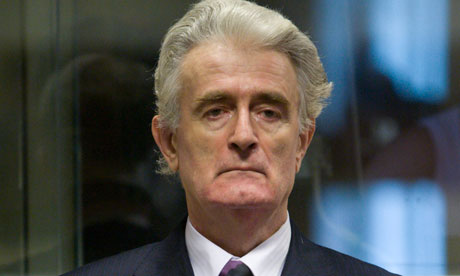By Connie Hong
Impunity Watch Reporter, Europe
THE HAGUE, Netherlands — The Yugoslav war crimes tribunal acquitted the former Bosnian Serb leader, Radovan Karadzic, of one charge of genocide. The charge covered the mass killings, expulsions and persecution by Serb forces of Muslims and Croats from Bosnian towns early in the country’s 1992-95 war, which left 100,000 dead.

Karadzic was arrested in 2008, 13 years after he was first indicted on charges of masterminding Serb atrocities during the war. His trial started in 2009, and prosecutors finished presenting their evidence in May. Earlier this month, Karadzic had asked judges to dismiss all 11 counts against him, claiming that the prosecutors had failed to prove their case.
The judges found that while there was enough evidence to uphold murder and persecution charges in the early stages of the war, the killings did not rise to the level of genocide.
Presiding judge Oh-Gon Kwon said prosecutors did not provide enough evidence to “be capable of supporting a conviction of genocide in the [Bosnian] municipalities.” A conviction of genocide requires a showing of intent to wipe out a specific group in whole or part.
Karadzic’s lawyer, Peter Robinson, welcomed the latest decision.
“Dr. Karadzic and myself both thought it was a courageous decision of the trial chamber to say at this stage of the case that there was no genocide in the municipalities in Bosnia in 1992. But I do expect that the prosecution will want to appeal [against] this decision.”
Prosecutors had no immediate reaction, but the acquittal sparked outcry from survivors of the Bosnian war.
“We are shocked and disappointed,” said Edin Ramulic, who heads an association of victims in Bosnia’s Prijedor region. “We have no reason to hope now that the Serbs will go through catharsis and acknowledge that the non-Serbs in Prijedor had been killed, tortured, exterminated, raped.”
Karadzic still faces one genocide charge regarding his alleged involvement in the 1995 Srebrenica massacre of 8,000 Muslim men and boys. Additionally, Karadzic also faces 9 other counts of war crimes and crimes against humanity for his alleged role in running a violent campaign to eliminate non-Serbs from parts of Bosnia.
Karadzic is expected to start arguing his case on October 16. Karadzic’s former military chief, General Ratko Mladic, is also on trial on almost identical charges. The first witness in that trial is scheduled to begin testifying in early July.
For further information, please see:
The Guardian — Radovan Karadzic cleared of one genocide charge in The Hague — 28 June 2012
The New York Times — Ex-Leader of Bosnian Serbs Fails to Get War Crimes Trial Halted — 28 June 2012
Radio Free Europe Radio Liberty — ICTY Drops Genocide Charge Against Karadzic — 28 June 2012



